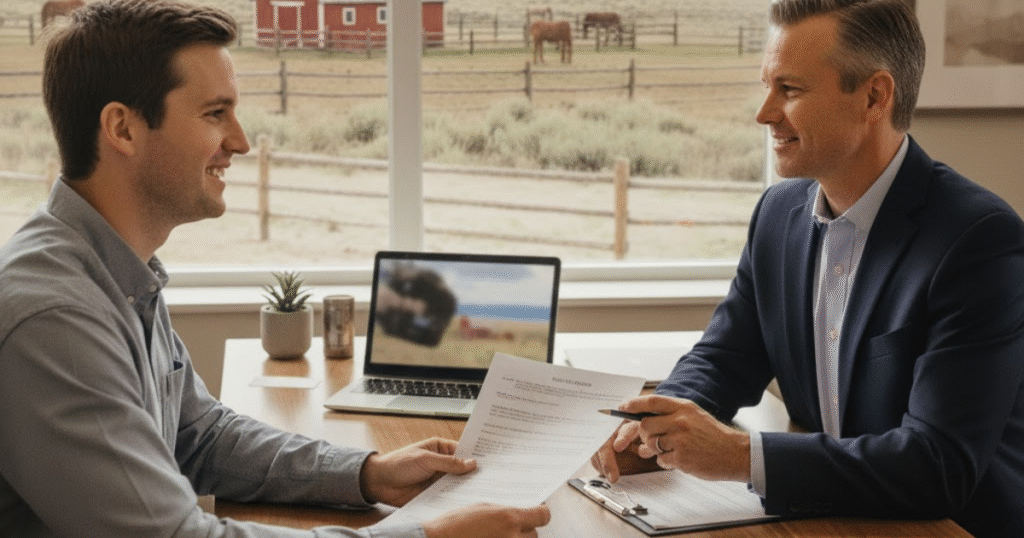
You found it, the perfect Colorado horse property with 15 acres, a 4-stall barn, a small outdoor arena, and mountain… views. You call your normal mortgage lender, and they say no. Financing a horse property is not like financing a regular home. To a big national bank, acreage looks risky, and a six figure barn may be valued at zero. You can still get a loan, you just need the right loan type and the right lender.
How Do I Get a Loan for a Horse Property in Colorado?
🐎 Quick Summary: Your Financing Game Plan
- It is not a normal home loan: Big lenders see risk in large acreage and unique structures like barns and arenas. A standard big bank mortgage lender will likely turn you down.
- The loan type depends on the property: A 5 acre hobby farm on a conventional loan is a different world from a 40 acre working ranch that requires a specialized agricultural loan.
- Expect a higher down payment: Plan for at least 20 percent down. For larger parcels, land loans, or properties above 1 million dollars, 25 to 35 percent down is common.
- Lender choice is everything: The most important step is choosing a local mortgage broker or an agricultural bank. They understand equestrian properties and will not be scared off by acreage.
1) The “Hobby Farm” Loan (Conventional or Jumbo)
This is for you if: You are buying a home on 5 to 20 acres, the house is the most valuable improvement, and you have steady W-2 income that is not farm related.
What it is: A standard Conventional or Jumbo mortgage. Your lender is willing to treat it as a house with a big yard, even though you will keep horses.
The catch, the appraisal: The bank appraiser may give real value only to the house and a limited portion of the land. A new indoor arena might be valued at little or nothing. If the appraised value is lower than your offer, you have an appraisal gap that you must cover with cash.
2) The “Working Ranch” Loan (Agricultural or Farm Loans)
This is for you if: You are buying 35 or more acres, or you plan to generate income from the property, such as boarding, training, breeding, or hay sales.
What it is: A specialized loan from an agricultural lender, such as a Farm Credit institution. These lenders focus on land and production.
The benefit: An agricultural lender understands your assets. They can recognize value in an 8 stall barn, an indoor arena, a hay shed, and irrigated pastures because they can be income producing.
The catch: Down payment requirements are usually higher, often 25 to 35 percent. You may also need a business plan that shows how the property will be productive.
3) The “In-Betweener” Loan (Portfolio Loan)
This is for you if: Your property is too unique for a conventional loan, but it is not a full scale farm. For example, a 25 acre luxury estate in Douglas County with a large barn.
What it is: A loan that a local bank or credit union keeps in house, in their own portfolio, rather than selling it to the secondary market.
The benefit: Because the bank keeps the loan, they can use common sense underwriting. A local banker can see the property and agree that the barn adds significant value, even if a standard appraisal does not.
The catch: These are relationship loans. You will need excellent credit, strong financials, and a solid relationship with a local community bank.
Get Your Financing in Order First
In a competitive Colorado market, do not shop for horse properties until your financing is real and ready. A generic pre approval from a national lender will not help if they do not lend on acreage.
You need a pre approval from a lender who has reviewed your file and confirmed they will lend on your target acreage and improvements.
This is where we help. We are not lenders, but we are your first call. We have a trusted network of Colorado mortgage brokers and agricultural lenders, and we can match you to the right one for your situation.
We Can Connect You to the Right Lender
Tell us your goals, acreage range, and timeline. We will point you to lenders who actually finance equestrian properties and who can get you a pre approval that sellers and listing agents will accept.
Frequently Asked Questions (FAQ) About Equestrian Financing
Why will a big bank not finance a 15 acre property?
Many large banks must keep loans inside a strict box so they can sell them. That box often has a 10 acre maximum. Anything over 10 acres is non-conforming for their products, so they decline it. This is not about your credit, it is about their rules.
How much down payment should I plan for?
Twenty percent is the minimum target to be competitive and to find a willing lender. For properties over 10 acres, or for farm and ranch loans, 25 to 30 percent down is common and makes your offer stronger.
What is the difference between a hobby farm loan and an agricultural loan?
A hobby farm loan is qualified off your W-2 income from a non farm job, and the property is treated like a home with acreage. An agricultural loan is qualified based on the property’s current or projected ability to produce income, and the lender values the barns, arenas, and irrigated fields as productive assets.
